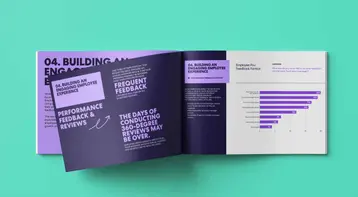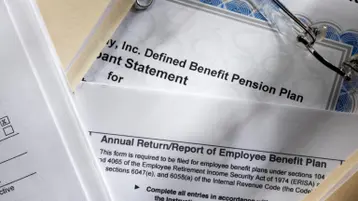
Table of contents
- 1.Ask the right questions
- 2.What HR forms do I need to fill out?
- 3.What maternity leave benefits do employees get?
- 4.How long can I get paid during my leave period?
- 5.Do I have to use my vacation time?
- 6.What can I do to help facilitate continuity?
- 7.Can I work remotely?
- 8.How do I add my new baby to my health insurance benefits?
- 9.What is a good time to touch base about returning to work?
- 10.Questions to ask HR about maternity leave
You're expecting a child? You'll be very busy in the upcoming months as you prepare for your bundle of joy. And here's another task for your to-do list: ask your employer or its human resources department
about your maternity leave. According to a report by the U.S. Bureau of Labor Statistics, just over 50% of women who were working at the time of their first birth said they took at least some paid maternity leave. However, for the majority of women in the workforce, maternity leave is not required by law. So, it's important to gather questions to ask HR about maternity leave and your company’s leave policy. For small- to medium-sized businesses, maternity leave can cause serious complications, After all, employees are essential company assets. So you help yourself and your company by talking ahead of time about maternity leave and your return.
Ask the right questions
Many employers strictly adhere to the rules stipulated by the federal Family and Medical Leave Act
(FMLA) regarding unpaid leave. There are many misconceptions about FMLA as it regards maternity leave. Learn more about FMLA in order to understand your rights. Be sure to consult a human resources representative or other managerial personnel about maternity leave for new parents. You might want to ask about paternity leave, too. In this article, we will suggest 8 key questions that you should ask. They cover topics such as maternity leave salary, health insurance, and childcare. They also can help uncover information about other benefits you may be entitled to as a part of company policy.
1. What HR forms do I need to fill out?
Talk to HR about maternity leave as early in your pregnancy as possible. Before you start your leave period, find out all the logistics involved in taking extended time off from your job. This might include filling out forms in the HR department. (And it need not be a major slog, a single meeting might be enough.) Be sure to fill out the required paperwork and get it sent through proper channels.
2. What maternity leave benefits do employees get?
When you ask HR about maternity leave, be sure to get specifics on any
benefits that you’re entitled to receive. For instance, under company policy, how much does your health insurance cover? Do you need updated benefits cards? Will you need to take short-term disability or long-term disability if you want to take an extended period off? Will your benefits contributions change? You might even find that your company offers other perks. Some companies offer such benefits as childcare, product discounts for working moms, and phased return-to-work schedules. You never know what’s available, so it’s always a good idea to ask as you prepare for maternity leave.
3. How long can I get paid during my leave period?
Find out how your employer administers benefits. You may or may not get an amount of paid leave. There is a lot of information to consider here. Some companies offer full salary for a designated time, while others offer just a portion of your salary. (You might also ask about paternal leave, if it applies.) Even if you decide not to take it, find out what the maximum amount of leave is. Human resources should be able to answer any questions about salary.
4. Do I have to use my vacation time?
You’ll need to ask this important question. Your company’s benefits structure may require you to use up your sick days and vacation accrual. Many companies require this before you are entitled to any maternity leave salary. (That's if, indeed, it's offered by the company or mandated by your state.) It’s common for companies to ask you to first use any PTO before you take any unpaid time off. Some consider it a condition of your maternity leave.
5. What can I do to help facilitate continuity?
It’s important to consider any effects that your absence may have on the workplace. How will your maternity leave affect your coworkers? To help facilitate coverage for your responsibilities, start a conversation about this long before your baby arrives. This will show a strong level of goodwill, and it will help your company avoid costly disruptions. Of course you will want to update your out-of-office message, if that’s applicable. You also can create a employee handbook that outlines your responsibilities. You can help train your temporary replacement. Or you can make arrangements to be available for urgent questions that may crop up. Anything you can do to help will be beneficial to both you and your employer. It’s important to stay connected, if you can. This will help ease your transition when you return to work.
6. Can I work remotely?
Working remotely is becoming more and more common. It’s possible that your employer may let you ease back into work from home, either part or full-time. Then, you can slowly make your way back to the office.
7. How do I add my new baby to my health insurance benefits?
This question is best asked before you take maternity leave; it’ll probably involve filling out more forms. Be sure to obtain a copy of what you fill out. And be timely about sending it in, so your baby can get coverage as he or she is born.
8. What is a good time to touch base about returning to work?
Even if you’ve chosen a return date, things can change. And you probably don’t want to just show up at the end of maternity leave without any prior communication. Talk to your employer about when would be a good time to start discussing your return to work. Then, put that time frame on your calendar. This will also help you set goals for your own transition. You should consider the coordination of childcare, your morning routine, your commute, and any other important logistics. This conversation is also a good time to discuss whether you’ll be returning to your current job, if that's possible. Maybe, instead, you'll be able to slide into another position of equal standing. Consider your continued career growth, and have that conversation. It will prepare you for any ongoing organizational change that may have occurred while you were on leave.
Questions to ask HR about maternity leave
This time is such an exciting time! It’s easy to get caught up in the mommy aspect of things, but
don’t neglect to handle your job transition. Get informed and stay informed; know the questions to ask HR, and ask them. That will better position you to spend time with your baby, free of the administrative details of your work career. Then, down the road, you'll be better able to balance motherhood with that career. You'll want to make the most of your maternity leave, so be sure to be well-informed.
This article is for informational purposes only, is not legal, tax or accounting advice, and is not an offer to sell, buy or procure insurance. It may contain links to third-party sites or information for reference only. Inclusion does not imply TriNet’s endorsement of or responsibility for third-party content.
TriNet Team
Table of contents
- 1.Ask the right questions
- 2.What HR forms do I need to fill out?
- 3.What maternity leave benefits do employees get?
- 4.How long can I get paid during my leave period?
- 5.Do I have to use my vacation time?
- 6.What can I do to help facilitate continuity?
- 7.Can I work remotely?
- 8.How do I add my new baby to my health insurance benefits?
- 9.What is a good time to touch base about returning to work?
- 10.Questions to ask HR about maternity leave






